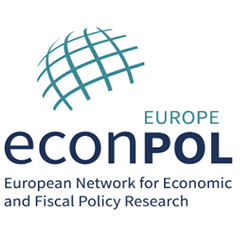Upswing phases are strongly linked to a rise in CO2 emissions. The effect is strongest in countries that depend on energy-intensive sectors. This is a key finding of the latest EconPol working paper. “We should adjust European environmental policy over the economic cycle: A good idea is to apply higher carbon taxes in ‘good times.’ We need to consider (procyclical) green taxation if we want to reach the climate goals as defined under the EU’s Covid-19 Recovery Plan,” says Antonia Díaz, one of the authors of the study.
Interestingly, it is not GDP growth alone that triggers rising levels of CO2 emissions but GDP growth coinciding with high energy intensity levels in an economy. The research further shows that an increase in the share of renewable energy in the primary energy supply during an upswing has the greatest impact on reducing CO2 emissions.
The study’s results were derived from an empirical model of dynamic panel data on a sample of sixteen Western European countries over the period 1980–2019. The data shows that disparate CO2 emission levels across countries can be explained by differences in energy intensity and in the different shares of renewable energy in the primary mix. “As an example, in the 1970s and 1980s Germany had a higher energy intensity than Spain. While Germany’s energy intensity has been decreasing steadily, Spain’s energy intensity patterns and CO2 emissions still have a clear cyclical behavior. This means that a country’s individual share of energy-intensive sectors matters but also the technological effort to reduce that energy intensity,” Díaz explains. The data indicates that a decoupling of economic growth from CO2 emissions could be achieved by reducing carbon emissions particularly in energy-intensive sectors.
As a way forward, policymakers could provide incentives for the adoption of renewable energy in the power sector and introduce procyclical fuel taxes in the transport sector. Such cyclical adjustment mechanisms could be a vital complement to the existing cap and trade principle of the EU Emissions Trading System. “All automatic stabilizers are cyclical in nature, as is monetary policy. Why not carbon taxes?” Díaz asks. The authors of the study further conclude that short-term emissions targets based on a regional (EU) level could be at least as important as long-term goals based on international climate agreements.
Read the full paper: “CO2 Emissions and Energy Technologies in Western Europe”, by J. Barrera-Santana, Gustavo A. Marrero, Luis A. Puch, Antonia Díaz, EconPol Working Paper 65, June 2021
About EconPol Europe


























